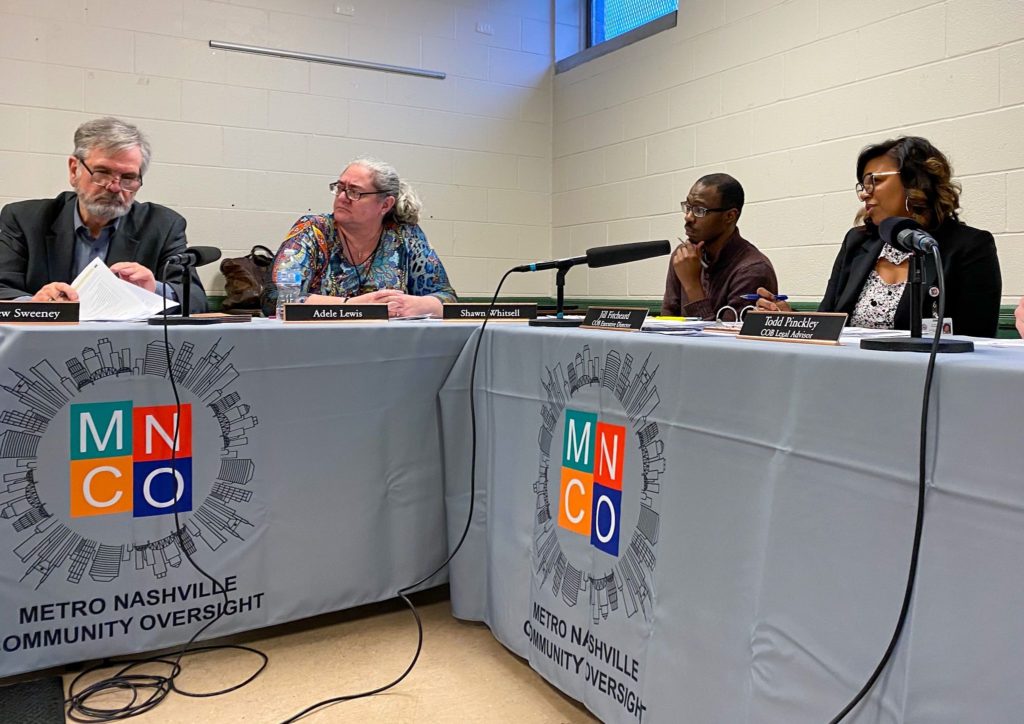
Nashville’s Community Oversight Board wants to investigate the death of a man who was arrested in February. The officers who arrested Gabriel Hines have been accused of using physical force.
The Metro Nashville Police Department says an internal investigation cleared them of wrongdoing. But the city’s new police oversight group still has questions.
According to police reports, Hines was arrested on Feb. 4, when officers allegedly found him and two other men stealing wood from a construction site. After a search reportedly turned up drugs, he was charged and booked at the Davidson County jail.
Five days later, Hines died at Centennial Medical Center. Many of the facts in this case are still murky.
It’s unclear why Hines was transferred to a hospital just days after his arrest, and an autopsy has yet to determine the cause of death.
Oversight Director Jill Fitcheard says that’s enough cause for an investigation.
“We definitely need to sit with the people who are decision makers and determine what do we do from here,” she says. “Because I am concerned about a man who passed away — who died — and nobody knows about it.”
Hines’ death first came to light earlier this week, when the Nashville Scene reported that at least one of Hines’ co-defendants has claimed that police officers used violence when arresting him. Hines’ attorney also told the Scene “he appeared to be in some physical distress” and was coughing up blood when they met a day later.
MNPD incident and arrest reports say “the suspect was taken into custody without incident.” A Metro Police spokesperson tells WPLN News that the department launched an investigation into the incident after it was “made aware of an allegation of a physical altercation between Hines and the arresting officers.”
The police department says that a representative from the Nashville district attorney’s office sat in on individual interviews with each of the arresting officers, and that the investigation “did not substantiate any use of force against Hines.” MNPD also says Hines “was suffering from a serious illness” and had been hospitalized a few months before his death.
The DA’s office has since turned over the case to the Tennessee Bureau of Investigation.
District Attorney Glenn Funk did not respond to a request for comment. A TBI spokesperson says the case “remains active and ongoing.”
Questions about oversight powers
Fitcheard doesn’t know if the oversight board has jurisdiction to investigate the death, since it happened after Hines left police custody.
The Metro charter that created the group in November 2018 gives the Community Oversight Board the “independent authority to investigate allegations of misconduct by the Metropolitan Nashville Police Department.” Hines’ co-defendant has reportedly raised such an allegation — but not directly with the oversight group.
The COB’s jurisdiction doesn’t extend to the Davidson County Sheriff’s Office, which had custody of Hines when he died.
Still, Fitcheard doesn’t understand why the COB wasn’t notified about the incident sooner, since it involved Metro Police. She plans to reach out to the police department and the DA’s office, to find out and whether the board can launch its own inquiry.
“If an officer used force, and the result was someone passing away, then that definitely would be under our jurisdiction,” she says.
Fitcheard doesn’t know if or when the board will find answers to all its questions. But she says delays to the city’s long-awaited body camera program have only further exacerbated the uncertainty.
More than three years after former Mayor Megan Barry first promised to bring body cameras to the city, MNPD launched a pilot program with traffic and DUI officers in March. That program was supposed to be expanded to more units this spring, but budget shortfalls from the COVID-19 pandemic have put those plans on pause indefinitely.
“If, in fact, we had body cameras, the way we should have them, we wouldn’t have all these questions,” she says. “We would have known if, in fact, what his co-defendant said was true, that there was some type of altercation. … Mr. Hines isn’t here to tell us what happened.”
Here’s an interactive timeline of the city’s body camera project:
Samantha Max is a Report for America corps member.

